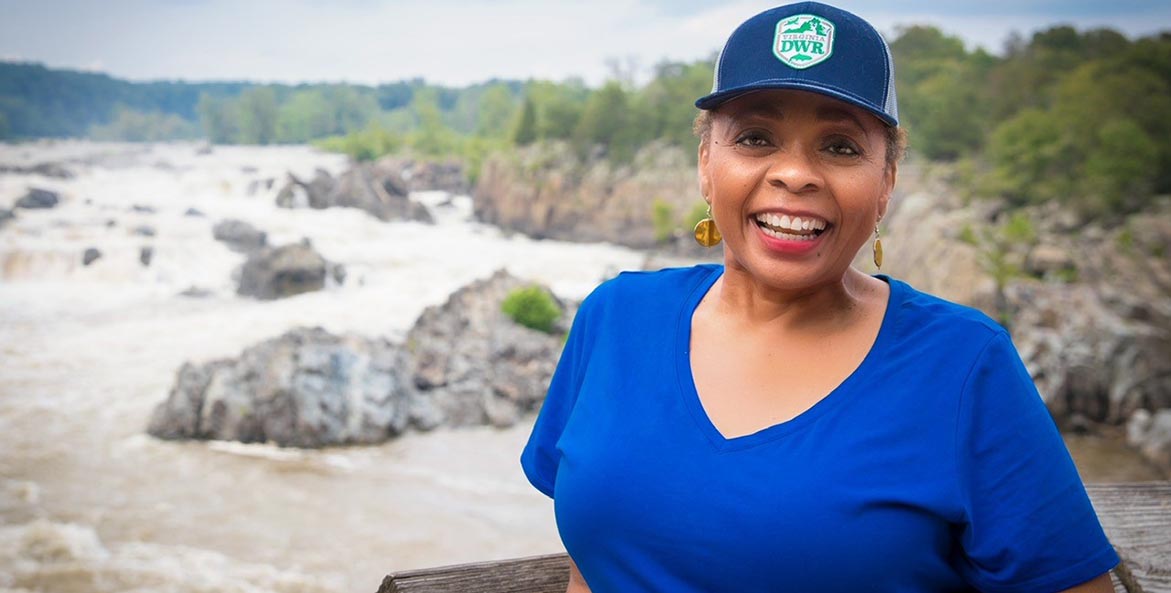This is Part Three of the History for All series, exploring the untold history and legacy of people of color in the Chesapeake Bay watershed and their ongoing part in its restoration.
Dr. Mamie Parker has spent her life making history as a Black, female conservationist, paving the way for young Black women who want to pursue a career in the environmental world.
Currently, Mamie is a consultant and board member for several organizations, including the Chesapeake Bay Foundation. Prior to this, she worked for the U.S. Fish and Wildlife Service (FWS) for almost 30 years.
Mamie started as an intern for FWS, working in a lab studying fish diseases. She continued to rise through the ranks in various positions in Wisconsin and Minnesota. Later, she worked in a hatchery, raising fish to stock in the Great Lakes. Then, she worked to incorporate more sustainable practices into construction projects that could affect water sources. Later, she worked with farmers on sustainable farming practices. Eventually, Mamie made her way to the title of what is now known as the Chief of Staff, the most coveted job in the U.S. Fish and Wildlife Service.
"The position allows one to see the entire system working across the country, rather than specific regions," Mamie says. "The position was the right-hand person to the Deputy Director, where you can sit in on meetings when talking to field biologists, governors, and senators."
Mamie later left this position and became the first Black person to be a regional director for the FWS. This led to one of her favorite accomplishments.
“As the regional director, I was able to write a letter for the National Wildlife Refuge system centennial time capsule in 2003,” Mamie remembers. "We wrote about emerging conservation issues that should focus on the idea of conservation for the benefit of the people. So, the capsule says that hopefully in 100 years, people are as important as wildlife and fisheries."
Mamie held herself accountable to achieve this more people-focused perspective. While Head of Fisheries and Conservation in D.C., there was a big issue determining who received flood insurance in places like Florida, where people lived in standard flood zones. Boundary lines were physically drawn on maps to make these insurance coverage determinations. However, some elected officials wanted to change those lines to meet their constituents' needs. Mamie and her staff worked hard to make this system computerized, so it wasn't so easy to re-map these properties for insurance purposes.
Despite her leading roles in the FWS, making waves as a Black female had its challenges.
Always speak to truth and to power. Remember to celebrate what is right in the world and to be humble.
"There are still days where I'm heckled during a speech or called the N-word. I've had meetings where people sit in seats around me, but not in the seat next to me until they have to," Mamie says. "I've loved my work, helping people navigate their way through change. And creating change in governance and programs is so important, but isolation does come with being a pioneer."
Mamie, growing up in southern Arkansas in the late 1950s to early 1960s, dealt with these issues since she was a child. She remembers the challenges of growing up in a still legally segregated society. “We weren’t even allowed to play with or even touch white kids back then,” Mamie remembers.
Throughout her career, Mamie often struggled with imposter syndrome. “I have a big challenge of believing in myself. I heard a lot of people say I got my jobs because of my race or gender, so I always felt that burden of having to overachieve to compensate for this,” Mamie stated.
In spite of the adversity Mamie has faced, she remembers a truly surreal part of her career when Virginia Governor Terry McAuliffe appointed her the Commissioner for the Department of Wildlife and Natural Resources. Mamie later became the chairman of the Board of Commissioners.
“My great grandmother, Anne Rolands, was an enslaved person here in Virginia. She eventually became a free woman and migrated to Arkansas. She lived as a slave for 30-plus years and was a free woman for 30 years. I want to think that she made history, too. So, to come back to the Commonwealth and become the board chairman, thinking of the concrete ceilings she broke before me, it’s an amazing feeling.”
Despite all the progress Mamie made throughout her career, she says her proudest moments are from the work she does now, as a board member and success coach in conservation.
“While all those things were important, I think success comes when you can help others.”
To young Black women that want to pursue careers in conservation, Mamie gives some advice: "Always speak to truth and to power. Remember to celebrate what is right in the world and to be humble. And don't get too caught up in always blaming others; focus on your actions!”




